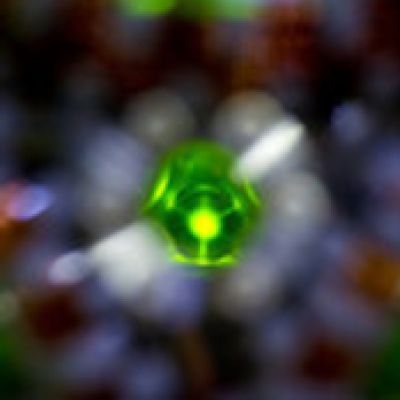Hear the latest news about everything from quantum computers to astrophysics, all straight from scientists at the University of Maryland.
https://hub.jqi.umd.edu/
Gesamtlänge aller Episoden: 15 hours 6 minutes
JQI Podcast Episode 9 - That's really tiny: Story of a photon
Can you see a single photon? Does it weigh anything? Emily Edwards talks to Alan Migdall, an expert on single photon technology. Part 2 of three installments on photons.
JQI Podcast Episode 10 - Energy Levels: This isn't your great-grandmother's plum pudding
Phil Schewe discusses quantized energy levels with Steve Rolston (JQI) and Wes Campbell (former JQI postdoc and current UCLA professor). The concept of electronic energy levels in an atom has applications everywhere, from sodium lamps to brake lights to quantum information and atomic clocks.
JQI Podcast Episode 11 - Discovery of heavy water makes waves
This past March, NIST Fellows Joseph Reader and Charles Clark co-authored an article in Physics Today: "1932, a watershed year in nuclear physics." In a small detour from our typical quantum conversation, Charles sat down with Phil to recount some remarkable nuclear physics discoveries made that year. This podcast details the search for an isotope of hydrogen, culminating in the discovery of deuterium (heavy water).
Taming chaos with physics and AI
In many situations, chaos makes it nearly impossible to predict what will happen next. Nowhere is this more apparent than in weather forecasts, which are notorious for their unreliability. But the clever application of artificial intelligence can help reign in some chaotic systems, making them more predictable than ever before...
The limits of computation
Modern computers, which dwarf their forebears in speed and efficiency, still can't conquer some of the hardest computational problems. Making them even faster probably won't change that. Computer scientists working in the field of computational complexity theory explore the ultimate limits of computers, cataloguing and classifying a universe of computational problems...
Labs IRL: Boxing up atomic ions
What makes a university physics lab tick? Sean Kelley grabs a mic and heads to a lab that's trying to build an early quantum computer out of atomic ions. Marko Cetina and Kai Hudek, two research scientists at the University of Maryland who run the lab, explain what it takes to keep things from burning down and muse about the future of quantum computers...
JQI Podcast Episode 12 : HAWC and the high-energy gamma rays
In our own galaxy and beyond, violent collisions fling a never-ending stream of stuff at the earth, and astrophysicists are eager to learn more about the processes that produce this cosmic barrage.
The Nobel Prize: A LIGO Q&A
A little more than a hundred years ago, Albert Einstein worked out a consequence of his new theory of gravity: Much like waves traveling through water, ripples can undulate through space and time, distorting the fabric of the universe itself. Today, Rainer Weiss, Barry C. Barish and Kip S...
Ancient timekeeping with a modern twist
Trey Porto, a NIST physicist and Fellow of the Joint Quantum Institute, spends his days using atoms and lasers to study quantum physics. But even outside of the lab, he views the world as one great physics problem to tackle. So one morning when he spotted some sunlight dancing across his wall, he couldn’t help but dive in and calculate its movements. He then took his project a step further and began constructing a sundial...
Long live MATHUSLA
More than 300 feet underground, looping underneath both France and Switzerland on the outskirts of Geneva, a 16-mile-long ring called the Large Hadron Collider (LHC) smashes protons together at nearly the speed of light. Sifting through the wreckage, scientists have made some profound discoveries about the fundamental nature of our universe...
